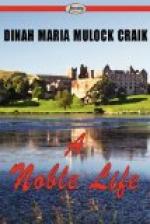Never, let the Castle be ever so full of visitors, or let his daily cares, his outward interest, and his innumerable private charities be ever so great, did he omit driving over twice or thrice a week to spend an hour or two at the Manse—in winter, by the study fire; in summer, under the shade of the green elm-trees—the same trees where he had passed that first sunny Sunday when he came a poor, lonely, crippled orphan child into the midst of the large, merry family—all scattered now.
The minister, Helen, and Boy were the sole inmates left at the Manse, and of these three the latter certainly was the most important. Hide it as she would, the principal object of the mother’s life was her only child. Many a time, as Lord Cairnforth sat talking with her, after his old fashion, of all his interests, schemes, labors, and hopes—hopes solely for others, and labors, the end of which he knew he would never see—he would smile to himself, noticing how Helen’s eye wandered all the while—wandered to where that rosy young scapegrace rode his tiny pony—the earl’s gift—up and down the gravel walks, or played at romps with Malcolm, or dug holes in the flower-beds, or got into all and sundry of the countless disgraces which were forever befalling Boy; yet which, so lovable was the little fellow, were as continually forgiven, and, behind his back, even exalted into something very like merits.
But once—and it was an incident which, whether or not Mrs. Bruce forgot it herself, her friend never did, since it furnished a key to much of the past, and a serious outlook for the future—Boy committed an error which threw his mother into an agony of agitation such as she had not betrayed since she came back, a widow, to Cairnforth.
Her little son told a lie! It was a very small lie, such as dozens of children tell—are punished and pardoned—but a lie it was. It happened on August morning, when the raspberries for which the Manse was famous. He was desired not to touch them—“not to lay a finger on them,” insisted the mother. And he promised. But, alas! The promises of four years old are not absolutely reliable; and so that which happened once in a more ancient garden happened in the garden of the Manse. Boy plucked and ate. He came back to his mother with his white pinafore all marked and his red mouth redder still with condemnatory stains. Yet, when asked “if he had touched the raspberries,” he opened that wicked mouth and said, unblushingly, “No!”
Of course it was an untruth—self-evident; in its very simplicity almost amusing; but the earl was not prepared for the effect it seemed to have upon Helen. She started back, her lips actually blanched and her eyes glowing.
“My son has told a lie!” she cried, and kept repeating it over and over again. “My son has looked me in the face and told me a lie—his first lie!”
“Hush, Helen!” for her manner seemed actually to frighten the child.




